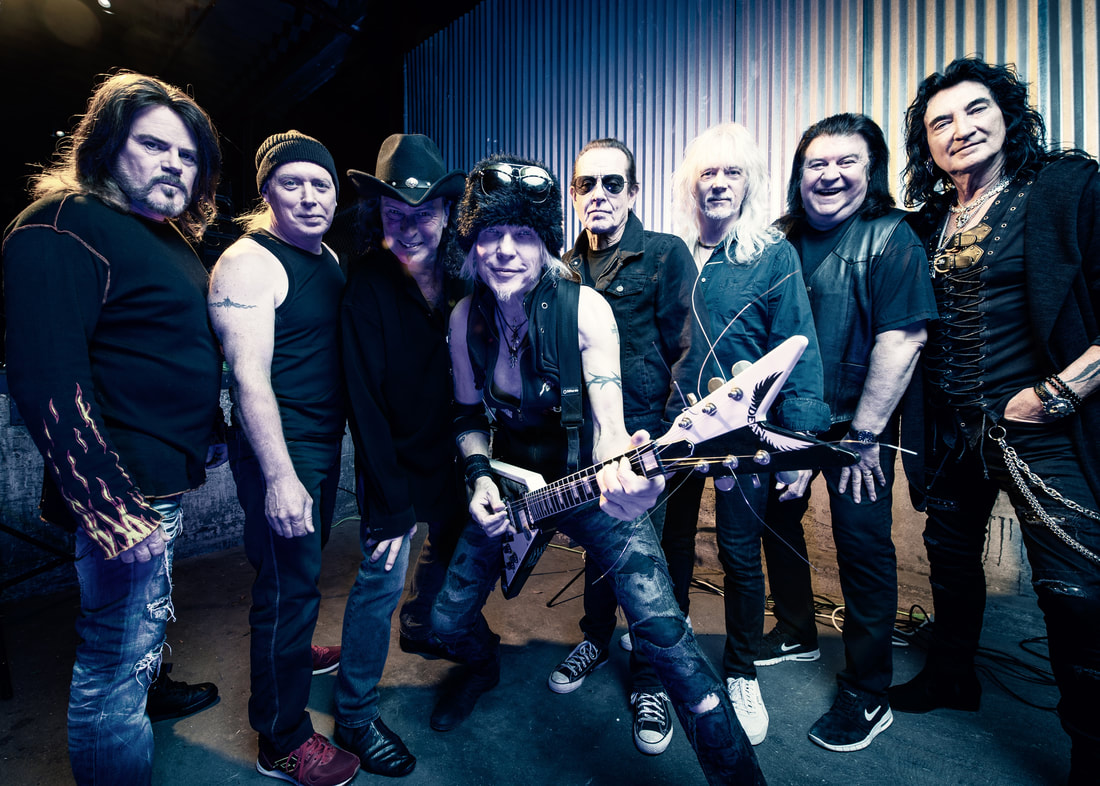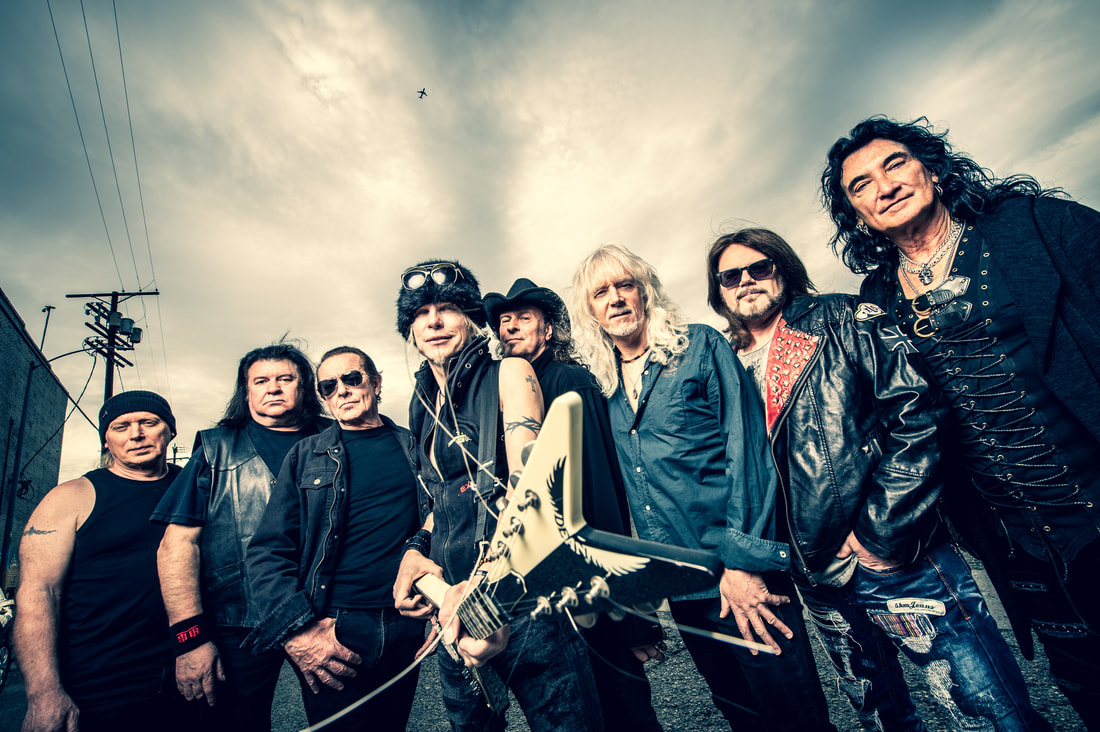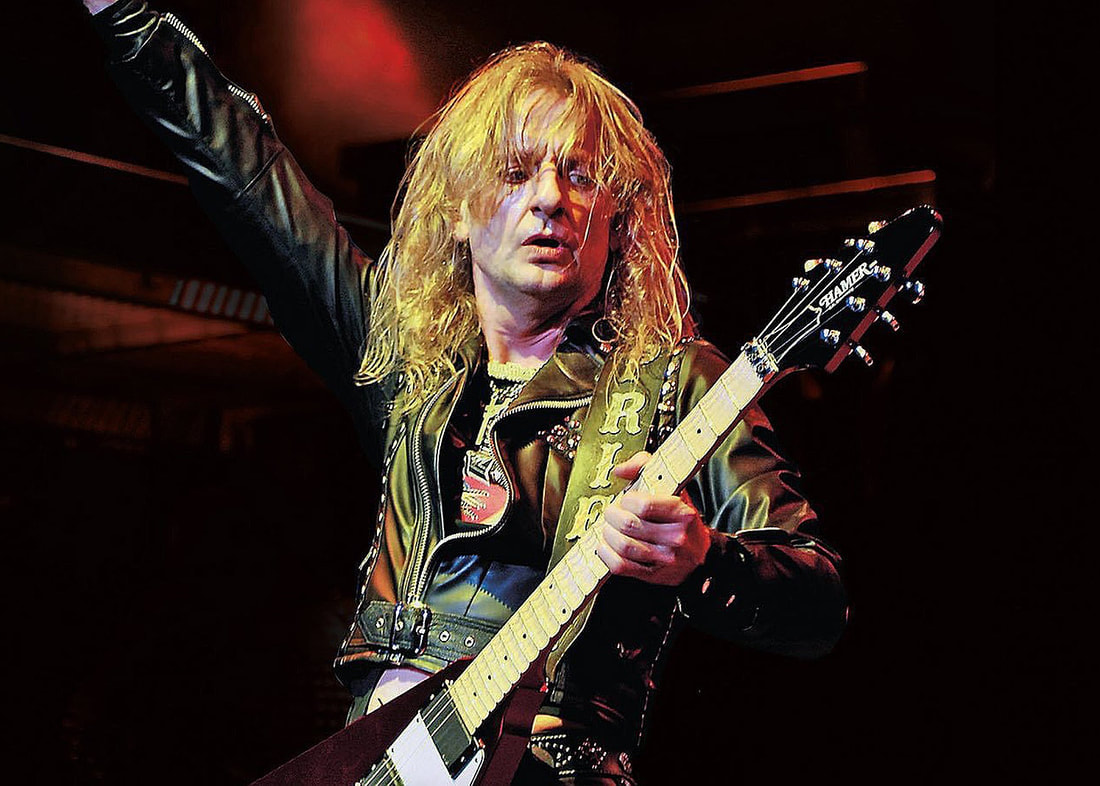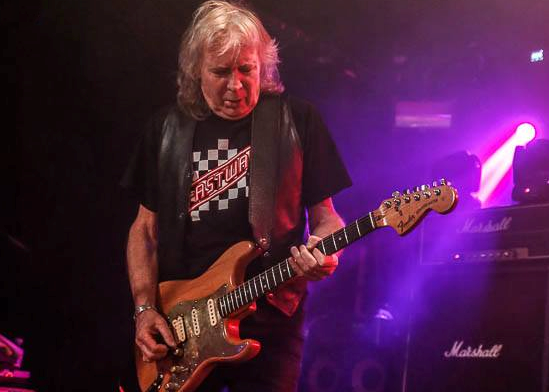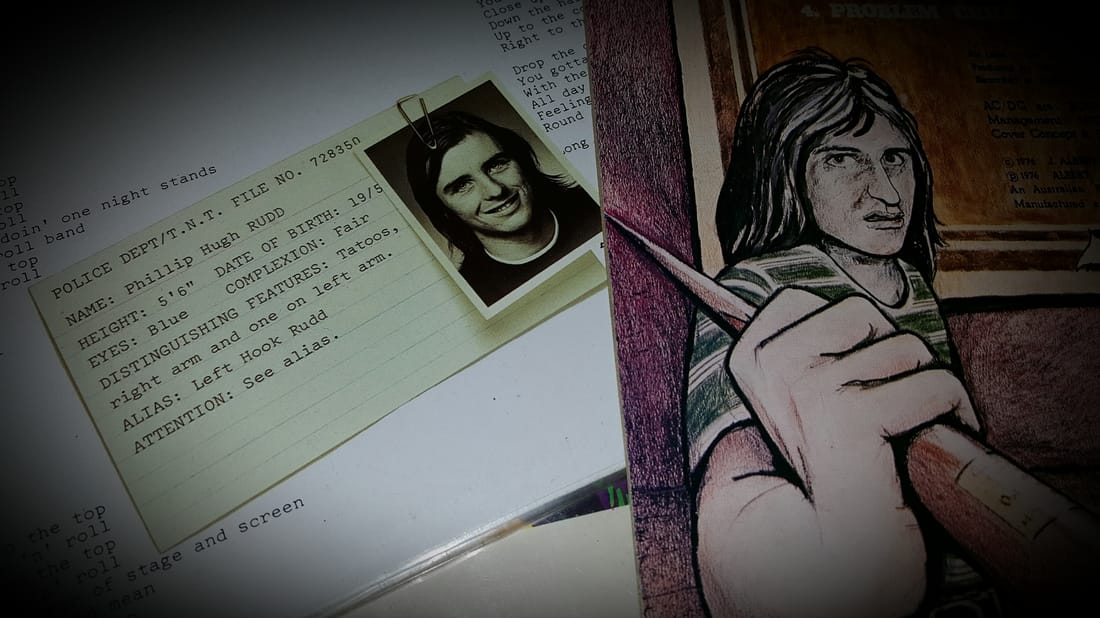|
It’s been a transformative few years for Michael Schenker. Reuniting with a host of musicians and performers who helped shape his career in the 1980s, the resulting Michael Schenker Fest has been a dream for long-time fans of the iconic guitarist. About to release the group’s second album, which features singers Gary Barden, Graham Bonnet, Robin McAuley and Doogie White, we sat down with Michael for a chat about the album, as well as his pending 50th anniversary as a recording artist. Tales of mystery; Eamon O’Neill.
How are you today Michael, you’re gearing up for the release of ‘Revelation’; you must be very excited about that?
Absolutely very excited. You know, this is the first time I can play the whole album! When I usually go in the studio, I don’t really know how to play the songs because you spend so long in the studio, by the time you finish, you’ve done so many overdubs and stuff you don’t really know anymore; you have to actually listen back to it and learn again. So with this album, because I enjoyed it so much, it’s really enjoyable to play, and I’ve ended up learning the whole album. I’ve never done this in my life! I can actually play the whole album until the end. Unbelievable! That can’t be easy, because Michael Schenker material is difficult for anyone to play. Well, I’ve not learned all the solos, but all the basic riffs and everything. ‘Revelation’ is a very riffy, melodic album; was that a natural direction for you to take? Yeah, it was just like, I noticed that the choruses they all had, like more minors [chords] in them, and I was really happy because it really worked well. It worked well for Graham [Bonnet], and I was really happy that Graham decided to have his own melodies and to write his own lyrics. He did a fantastic job, very majestic sounding. And also, I decided to carry on playing lead guitar over the choruses, as well as finding new parts for the solos. So most of the solos start off in the major [scale], then the flower opens up and becomes very melodic towards the end. That was something that unexpectedly happened, but it worked out really well. You’re known for your beautiful guitar tone, and it really shines on ‘Lead You Astray’ and ‘Under a Blood Red Sky’ in particular. I do what I normally do, but of course, Michael Voss our co-producer, he is a guitarist himself, and that’s one of the reasons that I hang out with him, because he’s a great musician. He plays so many instruments, and he’s got a very good head for drumming and stuff. But he is very specialised in the guitar, so, it’s very easy to get across what I need and what I want with him. The album kicks off with ‘Rock Steady’, which is a real anthem. Yeah, and it’s funny, because I wasn’t quite sure about it, because it started a little bit Stones-ey. I don’t know where that came from; it must be my filing system going back to 14 years old! But, I changed things around, I put that psychedelic thing in the lead break, so it’s a pretty commercial song, but with all the extra pieces. It balances out that actually, it becomes a very interesting song. Another highlight is ‘Sleeping With the Light On’, which has a real epic feel. I’m glad you’re saying that, because I tell you one thing, if you listen to ‘Sleeping With the Light On’, it’s a great song, but if you see the video with it, it’s going to bring it to a completely different world. It kind of gives the song another dimension. It’s really good. ‘Assention’ is a fantastic piece of music. Why did you choose to have an instrumental on the album this time around?
Well, you know it was supposed to be a vocal track but nobody found any vocals for it! Usually I do twelve songs, but I did thirteen this time because I thought maybe that ‘Rock Steady’ wouldn’t make it on the album. But it worked out really good, so we had thirteen songs, and we already had the backing for it, so I thought; what the heck, I’ll try to make an instrumental out of it, and I did and it worked. For a track like that, and with all your solos, do you tend to sit down and work out the solos, are do you just let it flow? The solos are improvised, but of course the melodies for the instrumentals are written. The album features a number of vocalists from right across your career; what was it like reconnecting with all of them? It was great. It clicked when I was playing Japan and we had Graham Bonnet as the support band. We had had Graham play a song with us, with Temple of Rock, and that’s when it clicked; that’s when I realised; “wait a minute; I have played the most popular music of Michael Schenker for so long with other singers; wouldn’t it be great to do it with the original singers in one go, all together?” So, I knew with Klaus [Meine, The Scorpions] and Phil Mogg [UFO], it would have been more difficult, but I thought maybe the ‘80s guys from MSG would be possible. So we called them up, and it was almost like they were waiting. They were really happy to do it, the same with the musicians. How were those first Michael Schenker Fest gigs? We started at Sweden Rock, that was the first show, and we took it very, very slow, step by step. Eventually we got invited to Japan and did the DVD which worked out really good, and the world was able to see the potential of the undertaking; it wasn’t just looking through the iphone and seeing it on YouTube. And then I thought the next thing should be a studio album; “what about Michael Schenker Fest in the studio?” So I talked to my lawyers, they spread the word, the record deals were coming in, and we ended up with Nuclear Blast. And that led to the DVD release ‘Live Tokyo International Forum Hall A’ in 2017? I invested into the DVD myself because it was such a beautiful venue, the Budakon. I wanted to have the Japanese footage with a nice venue and all of the three singers. And that then led to the next step. And then Doogie White kept calling up saying; “hey Micheal, when are we doing the Temple of Rock again”, and I said; “Doogie, you know what, why don’t you join the Michael Schenker Fest”. And then came the first album ‘Resurrection’. Yes. For the album cover, I wanted us to have a table with lots of food on it, and have a party in the recording studio! But it turned out ending up like everybody writing religious songs, like ‘Take Me to The Church’, and then Michael Voss wrote ‘The Last Supper’, and then the album cover turned into the Last Supper, and all of a sudden everything turned into a different direction. And then I thought of ‘Resurrection’. The band has been quite productive over a relatively short period of time. Well, we had a world tour, and that also worked out great, and everybody was getting on very well. The last show we did was in the U.K., and then we had another commitment, and there was a second leg of the U.S. tour for the ‘Resurrection’ album. So that took us into April 2019, then I called up Nuclear Blast and said; “I’m going to write another album”, and then that was it. You must be one of the first artists to embrace your past like that; it’s a real treat for hard core Schenker fans, isn’t it? Exactly. It must be amazing to see all of that flashing by on one show, over two and a half hours. For the newcomer, you may get a little of what it may have been like in the past. It’s not a clever design; it just happened on a step by step basis. You cannot calculate something like that, because you never know. You can only have ideas and see if people are willing to do it. But the beauty of that, and I realised later, was also that all of these different line-ups that I had in all of those different years of the ‘80s, was based on because I had experienced fame enough to make a decision if I wanted to stay in the lane of fame, or if I wanted to experiment with music and leave the spotlight, which I did. Weren’t you approached by Ozzy Osbourne to join his band in the early days of MSG?
Ozzy Osbourne was definitely not too happy with me having to experiment with my vision, because I wouldn’t have made him any money. The thing was, Cosy Powell [drummer] said; “Michael, you can’t join Ozzy Osbourne. We are in the middle of doing ‘Assault Attack’”, and I was tempted to do it, but then I had to remember my time with The Scorpions and with UFO, and I said to myself; “if I join Ozzy Osbourne, then I never needed to leave UFO in the first place, because it would be just more of the same thing”. For me, I had reached my peak with ‘Strangers in the Night’, and for that was it. So you decided to do things on your own terms from that point on? I started off unconsciously in the ‘70s designing something for the ‘80s, and then people said; “Michael Schenker is gone”, and for me, that was it! That’s when I had experienced enough fame to make that decision between; do I want to carry on two-dimensional, chasing something that I’m not interested in, or shall I follow my own vision? And my own vision was to experiment with music, to be an artist, and do things without pressure, in my own timing; find an unknown singer, and have fun with music. ‘Into the Arena’ was basically an introduction to entering the school of life, but then the battleground of the real world; learning about myself, learning about life, learning more about everything, and so as a result of that, I got everything out of my system. But now, there’s nothing left that I didn’t do, which basically led to fulfillment, so that was my reward. So you reached fulfillment at that early stage of your career? Now, in the third part of my life, I can celebrate, because everything has been completed, and the good thing is, I get a lot of icing now. In my middle years, I built the foundation, I built the cake, and I can put the icing on the cake. If I had of joined Ozzy, maybe I wouldn’t still be alive, and secondly, I would maybe have gotten a lot of money, but would not have taken care of myself, so I went the right way, and it was all meant to be this way. But now I can make up for what I couldn’t hold for the ‘80s; I dress like an ‘80s rock star now, I drive a sports car, and I celebrate! So, I’m making up; I took care of the necessity first; I build my house on a rock, a good solid thing. There is a saying; if you stay true to yourself, then everything else will be added onto you and more, and that’s exactly what’s happening. I wanted to ask you about the influence of Rory Gallagher on your playing. Rory Gallagher, and the band Taste – ‘What’s Going On?’ – was definitely one of my beginnings of being excited about rock music, together with Led Zeppeln, Deep Purple and Black Sabbath. I played Rory Gallagher with Klaus Meine when I was 14. We had a band called Copernicus, we played all of that stuff, and then we joined The Scorpions. Finally, in three years’ time, it will be the 50th anniversary of your debut recording with The Scorpions’ ‘Lonesome Crow’ album; would you like to celebrate that, perhaps reconcile with Rudolph? First of all, it has got nothing to do with Rudolph; I jump started The Scorpions twice. I jump started The Scorpions with ‘Lonesome Crow’; it was more about Klaus Meine and myself, because Rudolph was not really doing anything, other than maybe doing a bit of management. He wasn’t really a musician, he just wanted to be famous, so he took care of the stuff that would lead towards this; that’s how he courted his favourite singer in the neighbourhood, and of course he knew that his brother was developing into a lead guitarist with worldwide potential. So when we did ‘Lonesome Crow’, Klaus Meine - a great voice - and me, lead guitar playing as a 15-year-old immediately sprang internationally. You of course contributed hugely to The Scorpions on the ‘Lovedrive’ album as well. I also jump started them again with ‘Lovedrive’ when they got stuck and Matthias [Jabs] couldn’t complete the album, and I played throughout the whole album at the end of the day. I was supposed to play on four or five songs. I also wrote ‘Coast to Coast’, and the intro to ‘Holiday’, but my name was never mentioned, and nobody knows that you wrote it. So I make this known today because I know what Rudolph did was very sneaky. But I don’t mind him having all of that success, but he just did it in a sneaky way, and at the same time he was distorting my image by asking me if I would let him use my black and white flying V. I made a contract with them, as a sixth member of ‘Lovedrive’, but not to join them, so they had to put a picture of me on the album cover, which they didn’t, which was a breach of contract. So what I’m saying is in 2022, it has been fifty years since I have recorded ‘Lonesome Crow’, and to celebrate, maybe Klaus will be willing to perform ‘In Search of the Piece of Mind’, which was my first song I ever wrote. That year is also the anniversary of when I joined UFO, so that could be a big thing between Phil Mogg and Myself. We’ll wait and see what happens, but all of these things are possible. Like this interview? Like us on Facebook and follow us on Twitter for regular updates & more of the same. Michael Schenker Fest's 'Revelation' is released on Friday 20th September 2019, via Nuclear Blast. |
|
Michael Schenker
"I dress like an ‘80s rock star now, I drive a sports car, and I celebrate!"
© 2016 - 2024 eonmusic.co.ukContact: [email protected]
|

